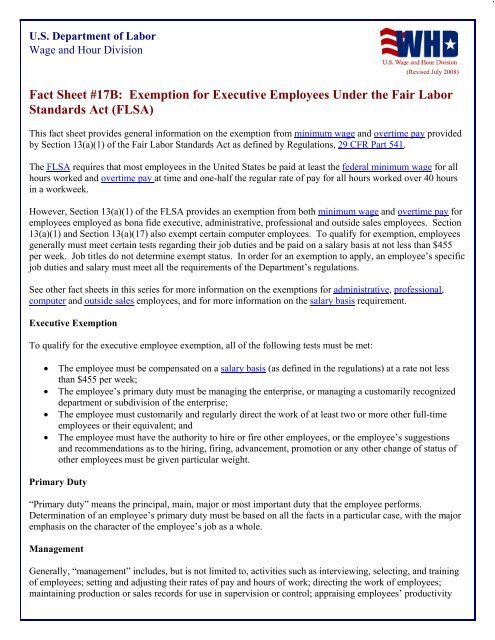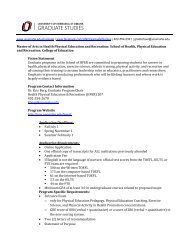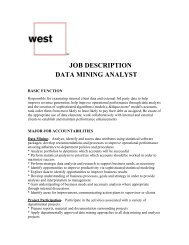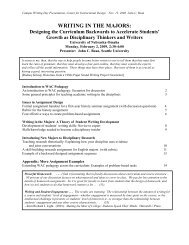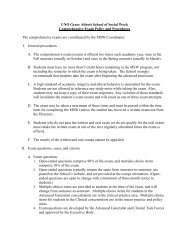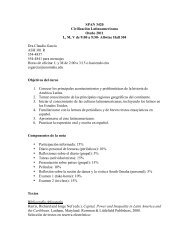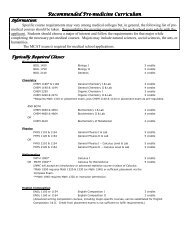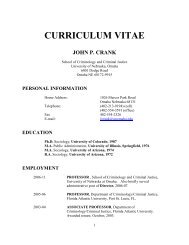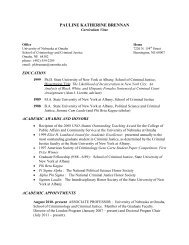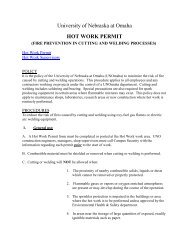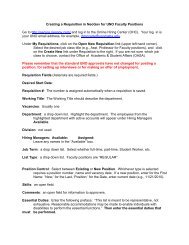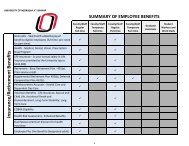Exemption for Executive Employees Under the Fair Labor Standards ...
Exemption for Executive Employees Under the Fair Labor Standards ...
Exemption for Executive Employees Under the Fair Labor Standards ...
You also want an ePaper? Increase the reach of your titles
YUMPU automatically turns print PDFs into web optimized ePapers that Google loves.
U.S. Department of <strong>Labor</strong><br />
Wage and Hour Division<br />
(Revised July 2008)<br />
Fact Sheet #17B: <strong>Exemption</strong> <strong>for</strong> <strong>Executive</strong> <strong>Employees</strong> <strong>Under</strong> <strong>the</strong> <strong>Fair</strong> <strong>Labor</strong><br />
<strong>Standards</strong> Act (FLSA)<br />
This fact sheet provides general in<strong>for</strong>mation on <strong>the</strong> exemption from minimum wage and overtime pay provided<br />
by Section 13(a)(1) of <strong>the</strong> <strong>Fair</strong> <strong>Labor</strong> <strong>Standards</strong> Act as defined by Regulations, 29 CFR Part 541.<br />
The FLSA requires that most employees in <strong>the</strong> United States be paid at least <strong>the</strong> federal minimum wage <strong>for</strong> all<br />
hours worked and overtime pay at time and one-half <strong>the</strong> regular rate of pay <strong>for</strong> all hours worked over 40 hours<br />
in a workweek.<br />
However, Section 13(a)(1) of <strong>the</strong> FLSA provides an exemption from both minimum wage and overtime pay <strong>for</strong><br />
employees employed as bona fide executive, administrative, professional and outside sales employees. Section<br />
13(a)(1) and Section 13(a)(17) also exempt certain computer employees. To qualify <strong>for</strong> exemption, employees<br />
generally must meet certain tests regarding <strong>the</strong>ir job duties and be paid on a salary basis at not less than $455<br />
per week. Job titles do not determine exempt status. In order <strong>for</strong> an exemption to apply, an employee’s specific<br />
job duties and salary must meet all <strong>the</strong> requirements of <strong>the</strong> Department’s regulations.<br />
See o<strong>the</strong>r fact sheets in this series <strong>for</strong> more in<strong>for</strong>mation on <strong>the</strong> exemptions <strong>for</strong> administrative, professional,<br />
computer and outside sales employees, and <strong>for</strong> more in<strong>for</strong>mation on <strong>the</strong> salary basis requirement.<br />
<strong>Executive</strong> <strong>Exemption</strong><br />
To qualify <strong>for</strong> <strong>the</strong> executive employee exemption, all of <strong>the</strong> following tests must be met:<br />
• The employee must be compensated on a salary basis (as defined in <strong>the</strong> regulations) at a rate not less<br />
than $455 per week;<br />
• The employee’s primary duty must be managing <strong>the</strong> enterprise, or managing a customarily recognized<br />
department or subdivision of <strong>the</strong> enterprise;<br />
• The employee must customarily and regularly direct <strong>the</strong> work of at least two or more o<strong>the</strong>r full-time<br />
employees or <strong>the</strong>ir equivalent; and<br />
• The employee must have <strong>the</strong> authority to hire or fire o<strong>the</strong>r employees, or <strong>the</strong> employee’s suggestions<br />
and recommendations as to <strong>the</strong> hiring, firing, advancement, promotion or any o<strong>the</strong>r change of status of<br />
o<strong>the</strong>r employees must be given particular weight.<br />
Primary Duty<br />
“Primary duty” means <strong>the</strong> principal, main, major or most important duty that <strong>the</strong> employee per<strong>for</strong>ms.<br />
Determination of an employee’s primary duty must be based on all <strong>the</strong> facts in a particular case, with <strong>the</strong> major<br />
emphasis on <strong>the</strong> character of <strong>the</strong> employee’s job as a whole.<br />
Management<br />
Generally, “management” includes, but is not limited to, activities such as interviewing, selecting, and training<br />
of employees; setting and adjusting <strong>the</strong>ir rates of pay and hours of work; directing <strong>the</strong> work of employees;<br />
maintaining production or sales records <strong>for</strong> use in supervision or control; appraising employees’ productivity
and efficiency <strong>for</strong> <strong>the</strong> purpose of recommending promotions or o<strong>the</strong>r changes in status; handling employee<br />
complaints and grievances; disciplining employees; planning <strong>the</strong> work; determining <strong>the</strong> techniques to be used;<br />
apportioning <strong>the</strong> work among <strong>the</strong> employees; determining <strong>the</strong> type of materials, supplies, machinery, equipment<br />
or tools to be used or merchandise to be bought, stocked and sold; controlling <strong>the</strong> flow and distribution of<br />
materials or merchandise and supplies; providing <strong>for</strong> <strong>the</strong> safety and security of <strong>the</strong> employees or <strong>the</strong> property;<br />
planning and controlling <strong>the</strong> budget; and monitoring or implementing legal compliance measures.<br />
Department or Subdivision<br />
The phrase “a customarily recognized department or subdivision” is intended to distinguish between a mere<br />
collection of employees assigned from time to time to a specific job or series of jobs and a unit with permanent<br />
status and function.<br />
Customarily and Regularly<br />
The phrase “customarily and regularly” means greater than occasional but less than constant; it includes work<br />
normally done every workweek, but does not include isolated or one-time tasks.<br />
Two or More<br />
The phrase “two or more o<strong>the</strong>r employees” means two full-time employees or <strong>the</strong>ir equivalent. For example,<br />
one full-time and two half-time employees are equivalent to two full-time employees. The supervision can be<br />
distributed among two, three or more employees, but each such employee must customarily and regularly direct<br />
<strong>the</strong> work of two or more o<strong>the</strong>r full-time employees or <strong>the</strong> equivalent. For example, a department with five fulltime<br />
nonexempt workers may have up to two exempt supervisors if each supervisor directs <strong>the</strong> work of two of<br />
those workers.<br />
Particular Weight<br />
Factors to be considered in determining whe<strong>the</strong>r an employee’s recommendations as to hiring, firing,<br />
advancement, promotion or any o<strong>the</strong>r change of status are given “particular weight” include, but are not limited<br />
to, whe<strong>the</strong>r it is part of <strong>the</strong> employee’s job duties to make such recommendations, and <strong>the</strong> frequency with which<br />
such recommendations are made, requested, and relied upon. Generally, an executive’s recommendations must<br />
pertain to employees whom <strong>the</strong> executive customarily and regularly directs. It does not include occasional<br />
suggestions. An employee’s recommendations may still be deemed to have “particular weight” even if a higher<br />
level manager’s recommendation has more importance and even if <strong>the</strong> employee does not have authority to<br />
make <strong>the</strong> ultimate decision as to <strong>the</strong> employee’s change in status.<br />
<strong>Exemption</strong> of Business Owners<br />
<strong>Under</strong> a special rule <strong>for</strong> business owners, an employee who owns at least a bona fide 20-percent equity interest<br />
in <strong>the</strong> enterprise in which employed, regardless of <strong>the</strong> type of business organization (e.g., corporation,<br />
partnership, or o<strong>the</strong>r), and who is actively engaged in its management, is considered a bona fide exempt<br />
executive.<br />
Highly Compensated <strong>Employees</strong><br />
Highly compensated employees per<strong>for</strong>ming office or non-manual work and paid total annual compensation of<br />
$100,000 or more (which must include at least $455 per week paid on a salary or fee basis) are exempt from <strong>the</strong><br />
FLSA if <strong>the</strong>y customarily and regularly per<strong>for</strong>m at least one of <strong>the</strong> duties of an exempt executive, administrative<br />
or professional employee identified in <strong>the</strong> standard tests <strong>for</strong> exemption.
Where to Obtain Additional In<strong>for</strong>mation<br />
For additional in<strong>for</strong>mation, visit our Wage and Hour Division Website: http://www.wagehour.dol.gov<br />
and/or call our toll-free in<strong>for</strong>mation and helpline, available 8 a.m. to 5 p.m. in your time zone, 1-866-<br />
4USWAGE (1-866-487-9243).<br />
When <strong>the</strong> state laws differ from <strong>the</strong> federal FLSA, an employer must comply with <strong>the</strong> standard most protective<br />
to employees. Links to your state labor department can be found at www.dol.gov/contacts/state_of.htm.<br />
This publication is <strong>for</strong> general in<strong>for</strong>mation and is not to be considered in <strong>the</strong> same light as official statements of<br />
position contained in <strong>the</strong> regulations.<br />
U.S. Department of <strong>Labor</strong><br />
1-866-4-USWAGE<br />
Frances Perkins Building TTY: 1-866-487-9243<br />
200 Constitution Avenue, NW Contact Us<br />
Washington, DC 20210


